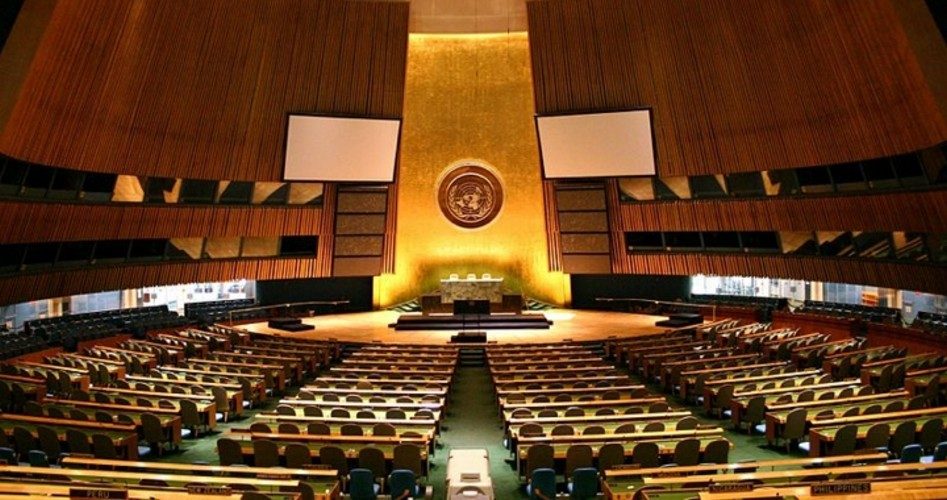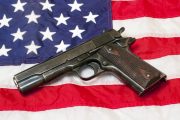
On September 23, the General Assembly of the United Nations will convene to discuss global nuclear disarmament. It is a different type of disarmament, however, that has caught the attention of a group of leaders of national organizations.
In a letter to President Obama dated August 19, representatives of 33 national religious and civil rights groups urge the president to sign the UN’s Arms Trade Treaty “without further delay.”
At an earlier meeting of the General Assembly held April 2, delegates from 153 nations — including the United States — approved the UN’s Arms Trade Treaty (ATT). The aim of this international agreement is to outlaw the buying, selling, owning, or transfer by civilians of firearms and ammunition.
To date, the Obama administration has not signed the treaty. In a statement to The New American, a State Department spokesman said that Secretary of State John Kerry and President Obama are anxious to sign the treaty and are waiting the approval of administration attorneys who are vetting the agreement.
The text of the letter encouraging President Obama to speed up the signing process is remarkable for its misstatement of critical provisions of the ATT, as well as for its disregard for the right to keep and bear arms protected by the Second Amendment:
We congratulate your Administration for helping to successfully conclude negotiations for an effective global Arms Trade Treaty earlier this year. The U.S. decision to join other leading supporters of the ATT helped overcome the consensus-blocking actions of three states and was critical to securing the overwhelming support for the treaty at the UN General Assembly on April 2. With the process of conforming the Treaty text in various languages to be resolved this month, we urge the US government to emphatically throw its support behind the treaty with your signature at the United Nations in New York in September.
Your signature would be a powerful step demonstrating the United States’ commitment to preventing mass atrocities and protecting civilians from armed conflict around the globe. We also encourage you to make a strong, high-profile statement of the Treaty’s value for national and international security and human rights protection at time of signature.
The development of the Arms Trade Treaty was a historic achievement. Governments joined together and agreed to a plan that will, if implemented rigorously and universally, put an end to the irresponsible arms trade that fuels so much suffering in the world. The Arms Trade Treaty is a common sense agreement that will have positive impacts for US security and civilians living in the midst of armed conflict or unstable environments. Among other things, the Arms Trade Treaty prohibits arms transfer authorizations to states if the state “has knowledge at the time of authorization that the arms or items would be used in the commission of genocide, crimes against humanity, grave breaches of the Geneva Conventions of 1949, attacks directed against civilian objects or civilians protected as such, or other war crimes.”
We urge you to seize the opportunity to sign as soon as possible in order to build momentum for additional signatures and rapid entry into force. If the United States clearly signals its intent to be bound by the Treaty, other countries currently sitting on the fence are more likely to follow.
Your Administration demonstrated leadership by supporting the Treaty through its development. Signing the Arms Trade Treaty will demonstrate strong US leadership and help create important momentum for the treaty.
We respectfully encourage you and your Administration to seize this historic opportunity and provide US signature on the Arms Trade Treaty this September.
The letter is signed by the following individuals on behalf of the organizations they represent:
Melanie Greenberg, president and CEO , Alliance for Peacebuilding
Shan Cretin, general secretary, American Friends Service Committee
Eric Sapp, executive director, American Values Network
Frank Jannuzi, interim co-executive director, Amnesty International, USA
Daryl G. Kimball, executive director , Arms Control Association
Sarah Holewinski, executive director , Center for Civilians in Conflict
Stanley J. Noffsinger, general secretary, Church of the Brethren
Kathi Lynn Austin, executive director, Conflict Awareness Project
Alexander D. Baumgarten, director of government relations , The Episcopal Church
John Bradshaw, executive director, Enough Project
Dennis W. Frado, director, Lutheran Office for World Community , Evangelical Lutheran Church in America
Emira Woods, co-director , Foreign Policy In Focus
Diane Randall, executive secretary, Friends Committee on National Legislation (Quakers)
Krista Hendry, executive director , The Fund for Peace
Dr. Gregory H. Stanton, president, Genocide Watch
Don Kraus, president & CEO , Globalsolutions.org
Kenneth Roth, executive director, Human Rights Watch
Michael Christ, executive director, International Physicians for the Prevention of Nuclear War
Robert Naiman, policy director , Just Foreign Policy
Gerry G. Lee, director, Maryknoll Office for Global Concerns
J. Ron Byler, executive director, Mennonite Central Committee U.S.
Galen Carey, vice president for government relations , National Association of Evangelicals
Raymond C. Offenheiser, president , Oxfam America
Hon. Ross Robertson, MP, president, Parliamentarians for Global Action (PGA)
Patricia Chappell, SNDdeN, executive director , Pax Christi USA
Jon Rainwater, executive director , Peace Education Fund
Catherine Thomasson, MD, executive director , Physicians for Social Responsibility
Rev. Dr. J. Herbert Nelson, director, Office of Public Witness Presbyterian Church (USA)
James E. Winkler, general secretary, General Board of Church and Society, The United Methodist Church
Mary-Frances Wain, deputy executive director, United Nations Association of the United States of America
Thomas H. Andrews, president and CEO, United to End Genocide
Bishop Richard E. Pates, chairman, Committee on International Justice and Peace, U.S. Conference of Catholic Bishops
Joy Olson, executive director, Washington Office on Latin America
While many names and groups in the list above are some of the usual suspects that constitutionalists would expect to be found in the ranks of those attacking the Second Amendment specifically and the Constitution in general, the participation of some of the more “mainstream” religious organizations is disturbing in light of the indisputable fact that a disarmed populace would be powerless to defend the very freedom that is our most valuable gift from God.
And, as we have reported, several provisions of this treaty significantly diminish the scope of the right to keep and bear arms.
First, the Arms Trade Treaty grants a monopoly over all weaponry in the hands of the very entity (approved regimes) responsible for over 300 million murders in the 20th century.
Furthermore, the treaty leaves private citizens powerless to oppose future slaughters.
Article 2 of the treaty defines the scope of the treaty’s prohibitions. The right to own, buy, sell, trade, or transfer all means of armed resistance, including handguns, is denied to civilians by this section of the Arms Trade Treaty.
Article 3 places the “ammunition/munitions fired, launched or delivered by the conventional arms covered under Article 2” within the scope of the treaty’s prohibitions, as well.
Perhaps the most immediate threat to the rights of gun owners in the Arms Trade Treaty is found in Article 5. Under the title of “General Implementation,” Article 5 mandates that all countries participating in the treaty “shall establish and maintain a national control system, including a national control list.”
This list should “apply the provisions of this Treaty to the broadest range of conventional arms.”
After creating this database, the federal government would be required under the provisions of Article 5(4) of the Arms Trade Treaty to “provide its national control list to the Secretariat, which shall make it available to other States Parties.”
That’s right. The UN treaty demands that the list of gun and ammunition owners not only be in the hands of our own government, but be sent to foreign regimes, as well. This provision would guarantee that should an American owner of a legally purchased firearm decide to emigrate, he will be on the radar of the ruling regime in his new home.
Americans are right to recognize this registry as the first step toward confiscation. Without such a registry, it would be impossible to monitor weapons transfers effectively because governments can’t track weapons exchanges and transfers unless they know who has them to begin with.
Article 12 adds to the record-keeping requirement, mandating that the list include “the quantity, value, model/type, authorized international transfers of conventional arms,” as well as the identity of the “end users” of these items.
In very clear terms, ratification of the Arms Trade Treaty by the United States would require that the U.S. government force gun owners to add their names to the national registry. Citizens would be required to report the amount and type of all firearms and ammunition they possess.
Section 4 of Article 12 of the treaty requires that the list be kept for at least 10 years.
Finally, the agreement demands that national governments take “appropriate measures” to enforce the terms of the treaty, including civilian disarmament. If these countries can’t get this done on their own, however, Article 16 provides for UN assistance, specifically including help with the enforcement of “stockpile management, disarmament, demobilization and reintegration programmes.”
As of press time, the White House had not issued a comment on the religious leaders’ letter pushing for prompt signing of the Arms Trade Treaty.
Photo of United Nations General Assembly hall in New York City
Joe A. Wolverton, II, J.D. is a correspondent for The New American and travels frequently nationwide speaking on topics of nullification, the NDAA, and the surveillance state. He can be reached at [email protected].



